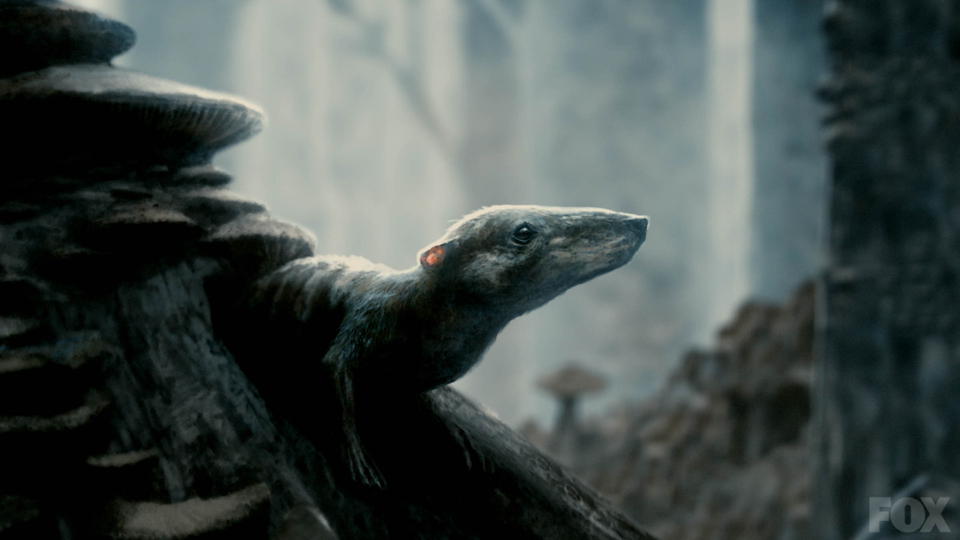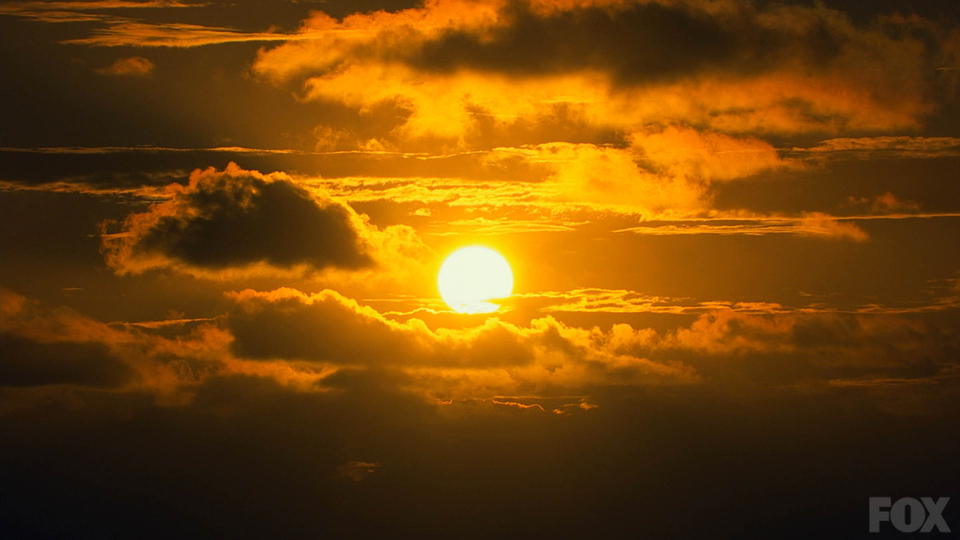 |
| Perhaps all of our great^N-grandmother. (cosmosontv.com) |
Unfortunately, the FOX station in New Orleans is apparently run by a producer or two who have yet to make the ape-human transition and didn't want us to hear about it. A friend of mine claims to have seen a similar event to that which made meager headlines in Oklahoma, where the local FOX station cut to a nightly news promo to cover up Neil deGrasse Tyson's mentioning of human descent from the trees. Creationists like this are beyond reproach for their actions, because they obviously haven't even considered the value of viewpoints other than their own, but that doesn't stop me from feeling very, very sorry for them and their myopic little cage in which they lock their intellects.
But that shouldn't stop us from having all the fun they're missing, so let's move on and talk about something interesting!
Nitpicks Rant
I'm sure I've missed something because geology is just not something I'm very knowledgeable about, but I could find nothing to correct in this episode. A perfect Cosmos? Probably not. I'll leave that open for any more geologically well-versed readers to point out their own nitpicks. My guess is that the Permian extinction and human evolution explanations given were merely best guesses and not The Way It Was for sure.
However, since I can't think of anything to really nitpick, as per our agreement after episode one of the series I get to rant a little bit. I happened to see something during the commercials that I really want to show you. This ad for Google starts off cute and ended up with me blinking through a few tears, so give it a shot (you need the sound!).
To all my teachers, formal and informal, who did more than just keep me from harming myself until three o'clock, thank you for helping me find my love of learning that gives me more depth and wonder in my life than I could have ever otherwise dreamt of. I hope I took the chance to say so before I moved on, but if by any coincidence you happen to read this, know that I am forever grateful.
For everyone else, I hope you can remember the classrooms you sat in or knees you sat on when you opened your eyes and saw learning as more than a chore for the first time. It's good to think of these things on occasion so that we don't miss a chance to help someone who looks up to us crack open that world for themselves. I can think of nothing more rewarding than for a fellow human being to share the ability to find joy in the reality of this incredible and yet, incredibly, comprehensible universe.
Thanks for humoring me while I dusted off the old soap box. Now let's get back to enjoying this TV show.
Nods
 |
| It's hard to find a picture of global warming, but I guess this has the atmosphere and the Sun in it. (cosmosontv.com) |
Well I hate to be a buzzkill after that sweet little aside, but it's time to talk about Anthropogenic Climate Change, that other thing that you have to think scientists are wrong about in order to receive significant campaign contributions from certain right wing donors. The good thing that deniers have going for them in this debate is that the climate is very complex - Models of the climate involve global-scale partial differential equations with models for radiative transport of energy, convection in the air and in the ocean, cloud formation and its effect on radiative inputs, ice formation, topography (mountains block the wind), plant growth, and more. All this complexity makes it easy for someone with a decent grasp of basic scientific concepts to raise some qualitative objections that sound just as incomprehensible to the layperson as the science itself, and so no wonder it's pretty easy to convince people that there are "good points on both sides".
This is the kind of misinformation campaign we saw in the episode on lead, where Claire Patterson had to try and convince a room full of congressional representatives (the hardest audience for a scientist is an audience that thinks it knows everything already, and you won't find a more prejudiced crowd than a group of lawyers that make a living spouting talking points), none of whom have any training in chemistry, that science was on his side and not his opponent's, who could also speak the same language and cajole the numbers into dancing to his tune. The fact is, in both cases, the basic principles are simple: Lead in gasoline gets into the environment, lead is harmful in the resulting concentrations in humans, and so removing lead from gasoline will improve health. Carbon-dioxide is a greenhouse gas which increases the amount of heat retained by the atmosphere, human activity accounts for the increase in CO2 concentration in the atmosphere to levels much higher than they have been on a timescale in the millions of years. Note that no one really disagrees with these two facts, and together they imply that humans are causing the atmosphere to retain more heat than it otherwise would.
The last bit of the puzzle is to answer the questions: "How much warming are we causing, and is that dangerous?" Unfortunately for the layperson, or the layperson with an American flag lapel pin and hair chiseled from marble who doesn't know he's a layperson, these are quantitative questions and will require calculations that are not simple to understand in detail from a one hour presentation in front of a posterboard. The takeaway is that scientists have constructed models which agree very well with the behavior of the climate on record and have been able to run comparisons with and without the man-made carbon emissions. These models predict the climate very well with the human CO2 added, but do not demonstrate the recent observed rise in temperatures without human CO2. That is basically a smoking gun in the chimney of every coal plant and in the exhaust pipe of every automobile. These models have been shown to predict subsequent changes in climate quite well, including matching the effects of large volcanic eruptions. The fact that you and I can't go through every line of code and check for ourselves that the models are legitimate is ok, because there are independent teams of scientists trying to replicate each other's results using their own methods. If they found huge disagreements when doing so, you can bet that they would publish a notable paper on the subject, and notable papers on important topics are basically the academic equivalent of striking a gold vein. If the models were flimsy, they would be quickly discarded.
So what do these models find? A range of outcomes for the future, heavily weighted towards dangerous levels of global warming that will upset the entire global landscape upon which we play out our little games of Risk. If we are serious about preserving the stability of our civilization, then we should not be rolling the (loaded) dice and hoping that we'll come out on top when it's too late to go back. The mass extinction that Tyson mentioned that we could cause? Well we're already causing it through many other means, and severely upsetting the stable climate zones that support life's diversity will only enhance our destruction of ecosystems. There is a very good chance that our increasing the temperature of the oceans, for example, could cause a disturbance in the flow of ocean currents, potentially robbing fertile ocean areas of their supply of warm or cool waters as well as drastically altering the climate across the entire globe. As Tyson pointed out, such a disturbance in ocean currents may have caused the environment in which our ape ancestors lived to become more arid and kicked off the evolution of humans. Sounds like we hit the jackpot last time, but I'm not sure we should keep pressing our luck.
News
 |
| Thank Venus and Jupiter for those ice ages, I guess? Amazing! (cosmosontv.com) |
As I said, geology is not a subject I'm very well versed in, so this episode was pretty packed with revelations for me. From the Rube Goldberg-esque series of chain-reaction disasters that caused the Permian extinction (Volcanoes, clouds of ash, hot and cold swings, ocean de-oxygenation, and poison gas, oh my!), to the relatively recent discovery of continental drift by Marie Tharp (by the way, bonus points to Cosmos for portraying the dismissive sexism that haunted and still haunts women's progress in the scientific fields and how it is foolish on the part of the sexist), I certainly picked up several new interesting bits of knowledge along the way. I was especially impressed that the formation of Panama could have been integral in our ancestors descending from the trees and developing the upright posture and impression of intelligence for which we are known today, but nothing surprised me like the fact that the gravitational pull of Jupiter and Venus actually had an effect on the tilt of the Earth's axis!
This is incredible for two reasons. The first is that the gravitational pull of Jupiter (which has the bigger maximum gravity, although both are of the same magnitude) on the Earth is at best equal to the gravity of the water in an Olympic swimming pool at a distance of about 20 meters, or 70 feet. That may sound like a lot of water, but in terms of gravity... Well, let's just say no one has ever been trapped in orbit around a swimming pool. The second thing that blows my mind is that the tilting effect of that tiny gravity is only due to the non-spherical shape of the Earth, which means that it's really about the difference in that gravity across the diameter of the Earth (half of the Earth is closer to the planet and feels more gravity than the other half, leading to a tiny amount of torque if the Earth is non-spherical), which has got to be basically nothing. What this means is that the timing of the next Ice Age is partly dependent on the fact that Venus's gravity is stronger on one side of the Earth than the other.
I don't know about you, but that's not something I generally see in my horoscope. Sorry, astrology, you just got served by science.
No comments:
Post a Comment